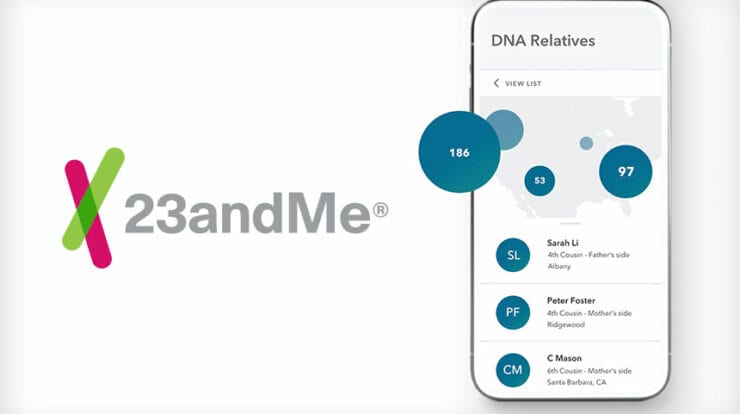
In today’s technological era, our personal information is increasingly at risk. Our online presence spans from banking details to social networking accounts, creating a wide digital trail. Yet, an often-neglected element of our private data is our DNA. As genetic testing companies such as 23andMe grow in demand, it’s crucial to grasp the implications for cyber security in safeguarding our DNA data. Explore this blog to dive deeper into this issue.
Why Are People Worried About Their Genetic Data’s Cybersecurity?
As technological progress enables us to delve into the mysteries of our DNA, an increasing number of people are seeking out genetic testing providers such as 23andMe. These companies offer important information about our heritage, health risks, and possible familial ties. Yet, this ease of access also introduces significant worries regarding data security.
Data Breaches:
The storage of vast quantities of genetic information in electronic repositories raises serious worries about the potential for security violations. Should this sensitive data fall into the hands of hackers, it could be exploited for nefarious activities such as stealing identities, defrauding insurance systems, and discriminating based on genetics.
Third-Party Sharing:
Companies that conduct genetic testing frequently collaborate with different entities, like drug manufacturers, for research purposes. Although these partnerships can result in significant scientific discoveries, they also create the risk of personal data being improperly managed or used.
Lack of Regulation:
The industry of genetic testing is still in its infancy and lacks thorough regulatory oversight. Consequently, there aren’t any uniform cybersecurity measures established, leading to a situation where people are unaware of the safety measures implemented to safeguard their personal information.
23andMe is a company specializing in personal genomics and biotechnology that examines your genetic code to offer information about your ethnic background, potential health concerns, and various characteristics. Established in 2006, the company has emerged as a prominent player in the consumer-focused genetic assessment industry.
Discover What 23andMe Has to Offer You:
-
Ancestry reports:
-
Health reports:
-
Trait reports:
-
DNA Relatives tool:
Make contact with individuals who have similar genetic makeup to you, possibly discovering relatives you were not aware of.
Privacy concerns:
-
Data security breaches:
-
Data sharing practices:
23andMe has formed alliances with drug companies to exchange user information that has been stripped of identifying details for scientific study, a practice that makes certain users uneasy.
-
Genetic discrimination:
Some individuals are worried that their genetic data might be exploited for discriminatory reasons by entities like insurers or employers.
What Makes Data Breaches Newsworthy?
For several months, cybercriminals illicitly accessed the private information of millions of individuals registered with 23andMe.
23andMe, a firm that conducts genetic analysis, examines individuals’ DNA to provide insights into their lineage and potential health vulnerabilities. In October 2023, cyber intruders managed to access sensitive data belonging to approximately 7 million customers of 23andMe.
Picture a scenario where an intruder enters your home and takes personal data regarding your relatives and ancestral background. This is what transpired with a vast number of customers at 23andMe—a business specializing in DNA analysis. Cyber criminals managed to illicitly access data from nearly 50% of the user base for a prolonged period of five months before the breach was even detected.
Here’s a summary of the latest information relating to this digital security incident:
- Hackers broke in: In April 2023, cyber intruders successfully inferred login credentials to gain access to user profiles.
- Millions affected: Cyber thieves illicitly obtained personal details of 6.9 million individuals, involving their full names, birth dates, familial ties, and genetic information.
- The business was unaware:23andMe was unaware for several months that hackers had taken data.
- Lawsuits filed: Individuals impacted became frustrated and filed lawsuits against 23andMe for failing to safeguard their information.
- 23andMe blames users: The firm asserts that the responsibility does not lie with them, and that users ought to have selected more secure passwords.
This matters greatly because genetic data is highly sensitive and has the potential for misuse in identity theft, discriminatory practices, or even as leverage for extortion. There is widespread dissatisfaction with 23andMe due to their insufficient efforts in safeguarding this information.
Genetic information of innumerable people was stolen!
How did this happen?
The cyber attackers didn’t need to compromise the security of 23andMe’s networks. They employed a technique known as “credential stuffing.” In this approach, they take login details from various platforms and attempt to gain access to accounts on different sites by using the same credentials.
Why is this a big deal?
Our DNA data is highly sensitive and can be exploited for malicious purposes such as stealing one’s identity or coercing individuals. There is concern and dissatisfaction among individuals that 23andMe did not take greater measures to safeguard their genetic information.
What can companies do?
Businesses can contribute by enhancing security measures to prevent cyber criminals from accessing our personal data. Additionally, they can educate their patrons on best practices for maintaining online security.
In What Ways Can You Safeguard Your Genetic Information?
The apprehensions regarding the safety of genetic information in the cyber world might feel insurmountable, but there are measures you can employ to safeguard your data:
Read the Privacy Policy:
Prior to sending off your sample for genetic analysis, make sure to meticulously check the company’s policy on confidentiality. Pay close attention to their statements about how they secure your data, if they pass it to others, and their dedication to safeguarding your personal details.
Choose a Reputable Company:
Make sure to conduct comprehensive research prior to choosing a service for genetic testing.
Limit Sharing:
Certain genetic testing providers offer you the option to restrict how much your information is utilized for research purposes or disseminated to external entities.
Understand the Risks:
Stay aware of the risks associated with your genetic data being accessed by unauthorized individuals.
Secure Your Online Accounts:
Craft robust and distinctive passwords for your accounts related to genetic testing and, whenever you have the option, activate multi-factor authentication for added security.
Update Your Privacy Settings:
Examine the privacy options within your DNA testing account. Confirm that you are disseminating data exclusively with trustworthy individuals and modify the privacy configurations accordingly to safeguard your personal information.
How Are These Issues Being Handled or Fixed?
As recognition increases regarding the dangers of cyber threats to genetic information, steps are being taken to mitigate these issues.
Improved Encryption:
Companies that offer genetic testing are focusing on enhancing their data protection strategies by implementing more robust encryption techniques. This encryption transforms the information into a complex code, which poses a significant obstacle for hackers attempting to access and interpret the data.
Legislative Efforts:
Worldwide authorities are increasingly acknowledging the necessity to control the genetic testing sector. New laws are being enacted to set guidelines for managing data and implementing procedures to ensure digital security.
Ethical Guidelines:
Professional associations and academic bodies are formulating ethical standards for the proper handling of genetic information. The objective of these standards is to safeguard the privacy of individuals while still facilitating advancements in science.
How Do We Maintain Safety?
It’s crucial to create robust and unique passwords for every individual site you access. Additionally, exercise caution regarding the personal details you divulge on the internet, including those shared with reputable organizations.
ALSO SEE:
The growing interest in genetic testing services necessitates attention to the cyber security challenges involved in securing your genetic information. Being cognizant of potential dangers, implementing appropriate safety measures, and advocating for improved data security can help preserve the confidentiality of your information. It’s crucial to remember that your genetic data is unique and significant, so it should be handled with the utmost care.


